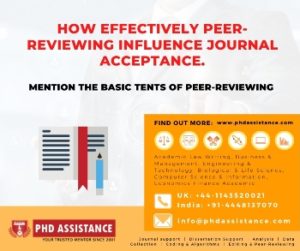How effectively peer-reviewing influence journal acceptance? Mention the basic tents of peer-reviewing
In-Brief
- PhD Peer Review Process is similar for all journals. Once author submits a manuscript, it is initially reviewed by the journal editor to determine its relevance according to the guidelines set by the editorial policy.
- Most of the journals use some form of a checklist for the reviewer to critically analyze the submitted article.
- PhD Manuscript Peer Reviewing process generally does not change the fundamental nature of the submitted manuscript; instead, it assists the authors to improve the presentation and format of their work.

Introduction
The PhD Manuscript Pre-Submission Peer Review process ensures the research findings are valid and reliable. The manuscript can not withstand scientific knowledge without an effective peer review process. Without the process, the result may include dissemination of false or flawed knowledge. It hardly takes about 10 to 12 weeks for publishing the manuscript in the scientific journal of which most of the time consumed by the peer-review process. Manuscript Peer Review a Guide helps to know about the reviewers to look for various aspects in the manuscript and look for the content that deems the necessary things for publication.
Importance of peer review
- To select the quality article for publication and filter the study that conceived, designed, executed with the following selection method,
- The validity of the research article and the methodology
- To check the precision of the result obtained whether supports the conclusion
- To check the relevance of the article
- To check the structure and format of the article
- PhD Dissertation Peer Reviewing Services to check against misconduct within the article
- PhD Manuscript Peer Review Process provides editors with the evidence to decide whether the articles meet the selection criteria of the journal
The peer-review process
The Peer review of the thesis is the critical process to ensure the quality and the integrity of the research. It is the process where researchers ask help to their expertise in their field to assess the article and check for its accuracy and rigour to help that the article builds or adds the current literature.
Manuscript Writing Help not only helps to maintain the quality and integrity of the literature in the manuscript. It’s key things that effectively develop your article. It is the way to keep abreast of current research, to impress journals to select the document submitted. Manuscript Peer Review Process Helps you to review a manuscript, and spot common flaws in research papers, and improve your chances of being published author.
Basic tenets of peer-reviewing
Four basic tenets involved in the Peer Review Service for PhD Manuscripts,
- Decline the review if you have conflict interest
The journal accepts High-value articles by standard form for separating the fact. For this particular reason, every researcher should conduct their work ethically by avoiding conflicts of interest. From conducting experiments to writing manuscripts and undergoing peer review, researchers must maintain a good account in their work. PhD peer reviewing services editors seek out experts in the field to review the manuscript and add the comment. There are rules for reviewers to avoid conflicts as well as simple rules for writing that help authors be clear regarding authorship and sponsorship.
- Remember you’re advising the journal editor, not deciding on whether to accept or reject.
The reviewer acts as the advisor to the journal editor. When writing a review, one should describe the reason for the recommendation so the editor can make an informed decision. It is more important to comment on the academic content of the paper than on grammar and punctuation mistakes found in the paper. However, if the language is too poor and if it is difficult to read the contents adequately, then alert the journal editor.
- Try to be helpful to the author
The review we make will be sent to the author of the paper. So, the reviewers are in a strong position to guide the author on how the manuscript can be in the standard format. While recommending acceptance or rejections, then the author can be beneficial from your review. The review should intently help the author to make a better decision to make the paper in the standard format. Peer review should be collegial and respectful.
- Maintain confidentiality of the paper
Reviewer revises the paper with the great understanding of the concept that they are handling. And this must be highly confidential as such they should not discuss the review or disclose any of the content in the paper to other third parties. The reviewer should not use their interest to develop the study further using their knowledge.
Conclusion
Most of the reputed journal accepts the paper that is peer reviewed. The increased use of the manuscript peer review is due to two main factors: The proliferation of the document is the primary reason to do peer review. The next reason is the explosion of new information in the field of study. PhD Manuscript Writing Peer review service experts help you to evade the significant errors that decrease the quality of the manuscript.
References
- Johnston, J., & Krauth, N. (2008). Peer reviewing: privilege and responsibility. TEXT: journal of writing and writing courses, 12(1).
- Kumar, D. P. (2013). PEER-REVIEWING, FEEDBACK & ASSESSMENT IN ENGINEERING TEACHING.
- Reynolds, R., Saleh, M., & Candler, C. (2010). MedEdPORTAL: Peer Reviewing, Publishing, and Disseminating E-learning. Bio-Algorithms and Med-Systems, 6(11), 101-104.
- Rennstam, J., & Kärreman, D. (2014, August). Control work in complex organizations: Constructive disobedience, translation and peer-reviewing in a high tech firm. In the yearly Academy of Management Conference, Philadelphia, PA.
- Bocanegra-Valle, A. (2015). Peer reviewers’ recommendations for language improvement in research writing. English as a scientific and research language. Debates and discourses: English in Europe, 2, 207-232.
 Previous Post
Previous Post Next Post
Next Post
